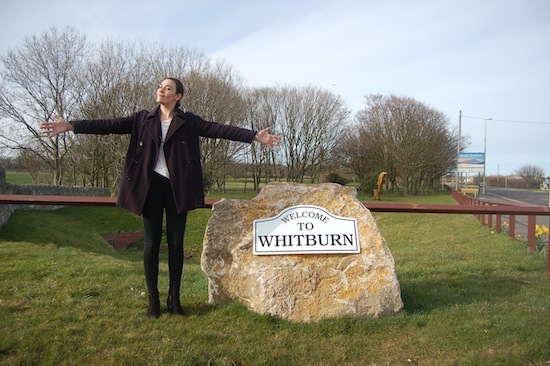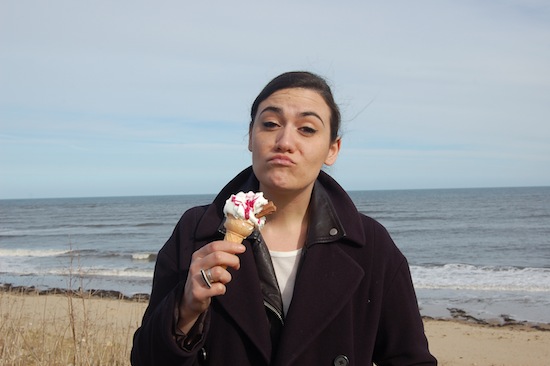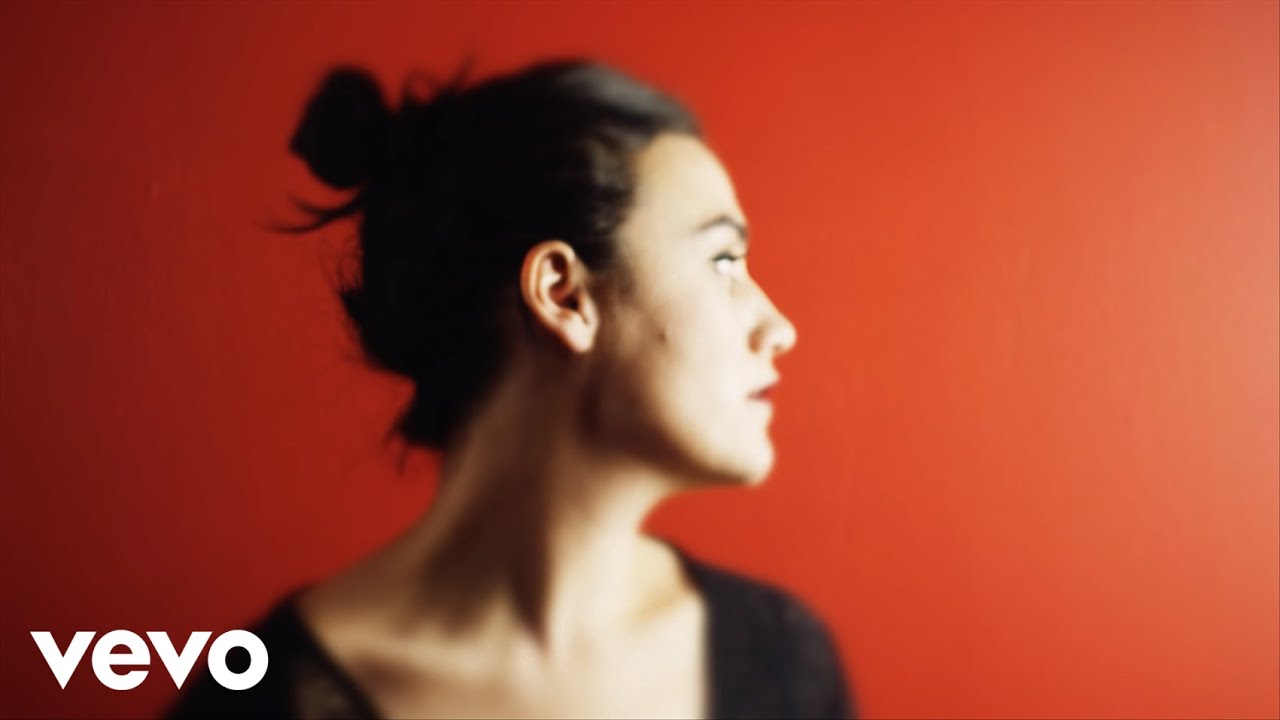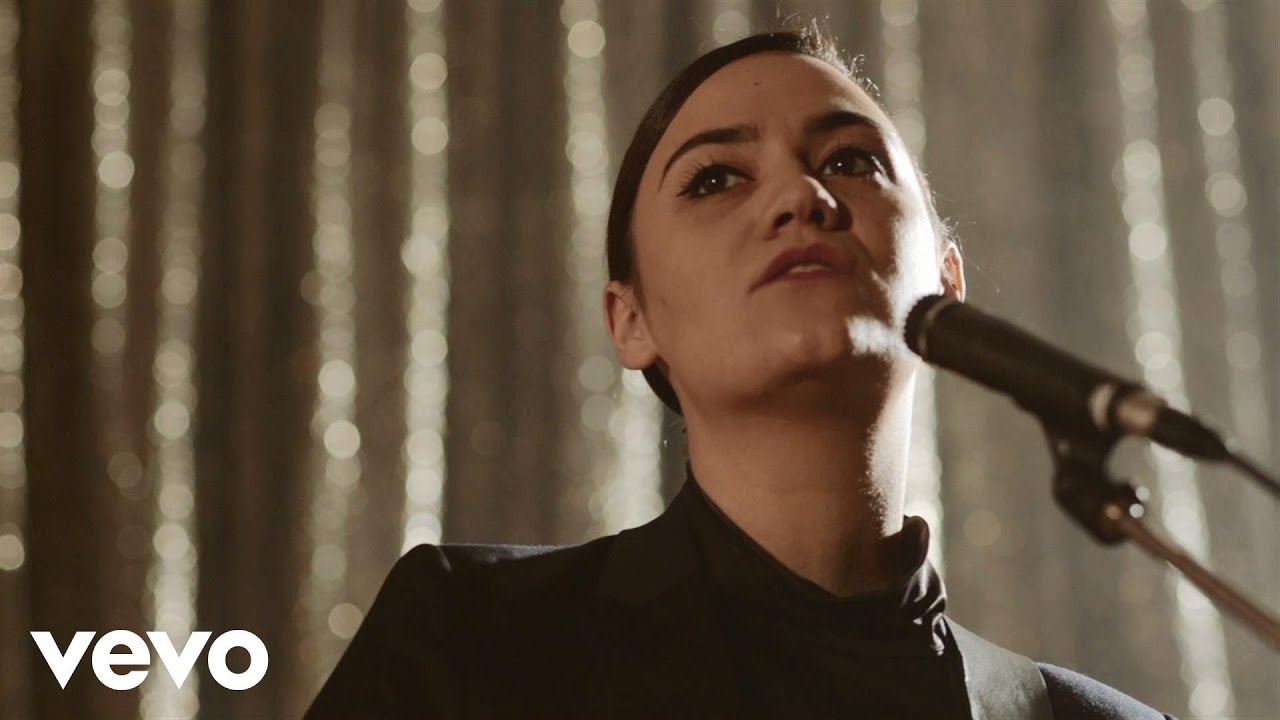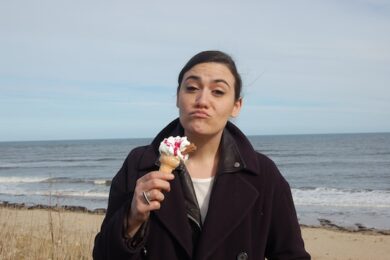The village of Whitburn lies five miles north of Sunderland on the Northumbrian coast. It ticks all the boxes required for a quintessential English seaside resort – freezing waves crashing onto a beach, acres of sand dunes, a gaudy amusement arcade, neat cafés selling fish and chips, and an army of colossal, scavenging seagulls.
Whitburn is also the family home of Nadine Shah, and we are both sat in the spring sunshine on the terrace of her parents’ house. The view is to die for; a vista of sky, sea and sand punctuated by kite-flyers and dog-walkers.
I’ve come to Whitburn to talk about Shah’s stunning new album, Fast Food. But before any interviewing can take place, Nadine’s mum wants to ensure we are both fed and watered. Lunch is a gigantic slab of glorious Norwegian salmon (Nadine’s mother hails from Norway, while her father’s family is from Pakistan) and the mealtime provides ample opportunity for some familial banter (including a bemused Nadine berating her mother for thinking a song on BBC 6 Music was by her daughter – "Mam, that’s not me, that’s Drenge!" "But she sounds like you." "It’s a bloody man, mam.")
After lunch, and after chatting about Fast Food, the guitar-driven follow-up to her 2013 piano-laden debut Love Your Dum And Mad, we head down to the beach. Ice creams need to be eaten – in Whitburn a Mr Whippy cornet is accompanied by "monkey’s blood" (raspberry sauce) – and the town’s ADHD-inducing amusement arcade entices us to play a violent game of air hockey (which, for the record, I win 7-6 in the last second) before Nadine is mobbed (politely recognised) by a horde of fans (three of her parents’ friends) on the seafront.
Earlier in the day I’d met Nadine in Sunderland. She’d been eager to show me Pop Recs, the record shop/ live venue/ art gallery/ café opened in 2013 by local band Frankie & The Heartstrings, and a beacon for the city’s music renaissance. Heartstrings’ drummer Dave Harper runs the shop and when we arrive, he’s chatting with Field Music’s David Brewis (and baby son, Will) about Brewis’ latest project, Slug. Shah’s presence completes a holy trinity of Sunderland’s indie rock glitterati.
On the short drive to Whitburn, Nadine and I listen to the Du Blonde album. Du Blonde is the new incarnation of Newcastle singer-songwriter Beth Jeans Houghton. Beth and Nadine have some shared history – both of their debut albums were produced by Ben Hillier (he of Blur, Depeche Mode, Elbow and U2 fame). But, while Du Blonde sees Houghton reinvent both her image and her sound for a second album release, Shah’s haunting vocals and stylish gothic pop remain central to the compelling magnetism of Fast Food. Some things are fine just as they are.
Sitting in the sunshine, Whitburn seems idyllic. How was it growing up here as a young child?
Nadine Shah: It was amazing. I’d play in the sand dunes and I had all these little routes to get to the beach from our back gate. It was the best playground to have as a back garden. But, because of where we are, I was quite detached from a lot of other stuff. Sunderland is the closest city but there wasn’t much going on there. I didn’t know any kids here, as I was sent to schools in Newcastle. The kids in the comprehensive school next to us would call me and my brothers the ‘secret children’ as they were aware that we lived here but didn’t see us at school. So, I had no friends that lived in this area and was even more isolated.
That must have been hard as you entered your teens.
NS: Being a young child was great, because of the beach, but my teens were terrible. It was claustrophobic in the sense that I was stranded. All my school friends started to go clubbing and to gigs in Newcastle, but my taxi journey home would be £25, which was extortionate. There was no public transport back to Whitburn, so I was really cut off from everything that was going on.
Didn’t there used to be a bit of a scene in places like South Shields in the 1960s?
NS: My mum insists that South Shields used to be a really vibrant place for gigs. Places like The Cellar Club meant the likes of The Troggs and Jimi Hendrix would play in South Shields. You wouldn’t believe it as it is pretty grim now.
I am an archetypal landlubber. As someone who grew up next to the sea, do you have a ‘need’ to be close by?
NS: It is ingrained in you; it’s in your blood. I wonder what it is. I’m not really away long enough from the sea to miss it. I’m home nearly every month so I get a dose of sea air. Most mornings, when I am here, I will go for a walk along the cliff tops. Many people who grow up by the sea need to be close – it’s almost a medical thing.
You moved to London when you were 17, but do you think the music you make is at all influenced by growing up in a place like Whitburn?
NS: I think the only thing was that it gave me more drive to leave where I was from. It was so suffocating – I was really, really bored – and I had aspirations to live in a really busy city. Music was an avenue to reach that. My eldest brother was in London and I’d been there many times, so it was the romantic idea of London being the big city and to go and ‘make it’ there.
What is your relationship with Whitburn like these days?
NS: Whitburn has been a constant. I now love it, even though nothing has changed here since I was a baby. I currently live in Tottenham, which is so busy and almost oppressive and you can get ground down by it. Whitburn is very laid back and I welcome that.
Let’s change tack. Can I ask you about your band? You make a clear distinction between Nadine Shah being a band, rather than you being a singer-songwriter. Why is the band concept so critical to you?
NS: The band is so important. Players may change, due to other obligations, but I love being part of a touring circus. It’s like having a family unit with you. It’s a much more enjoyable experience. Also, playing live for the last album informed the sound for the new one. I learnt how important our live show was. You spend a few weeks in the studio but months touring, and so it is important that you enjoy playing the songs live. There were two songs in the set of the first album which made people move and, more importantly, made my band move. The band was really enjoying playing the songs that were more ‘kinetic’. So, when I was writing parts of this album I was imagining what my bass player might enjoy playing, or what my guitarist might enjoy.
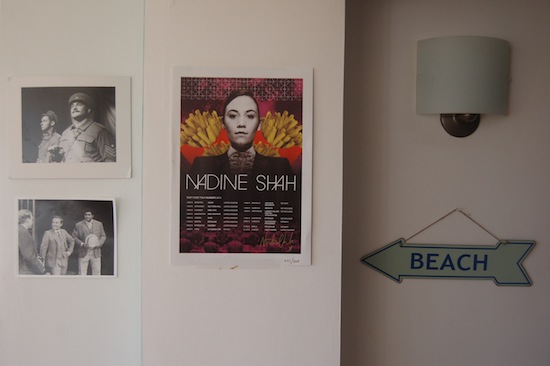
Obviously, a big difference for your second album is that your audience now has an expectation of what a Nadine Shah record could, or should, sound like. Did that create extra pressure?
NS: I was very aware that my name is almost a brand and that I have a certain following. I am very appreciative of that following and I wanted to be loyal to the existing fans. The new album isn’t a massive change. There are hints of it on the debut album – a song like ‘To Be A Young Man’ is more ‘band-like’. The first album started on piano. This time around I was only playing guitar, as it was easier to transport around while being on tour and I had gotten a bit bored of my piano. Also, I had no urge to go off and make a disco album. One of my favourite bands is Interpol and one of the arguments against them is that all their songs sound the same. I say great. I love the way they sound and do not want them to go off and make a disco album. I want more of the same from them.
Lyrically, Fast Food centres on a number of your past relationships. Compared to the subject matter of your debut album [on which several songs were written about the suicides of two ex-boyfriends], how difficult was it to write lyrics for the new record?
NS: I have to learn how to word this without it sounding crass. The people I was writing about on the first album are no longer with us, and the people I was writing about on this album are very much alive. That terrified me; there are certain details in certain songs and people are going to know it is about them. It was supposed to be a collection of portraits about people I have loved and still do love. It was very daunting; it’s so personal because it’s your present life as well. I found it really difficult.
Why do that to yourself then?
NS: I know; what an idiot. I think it’s because I am near the end of my 20s and I have become a lot calmer. You get very reflective. I had one significant break up and that was a catalyst for me looking back on past relationships and trying to work out the pattern of what I had been doing wrong. It was also about having an acceptance of people’s past. I would now worry if I met someone my age or older who hadn’t been in love before or didn’t have stories, but coming to terms with all that has been a really big battle. I was very paranoid for a long time – it maybe something to do with my anxiety – and it was almost crippling. I was very destructive in relationships and I’m not at all now. I am very, very calm. I wanted to write a coming-of-age album. That sounds horrible but the new record kind of is like that, both musically and from a lyrical content.
Many of your songs have huge emotional significance for you. How difficult is it for you to perform them night after night?
NS: Well, in comparison to the first album, none of these new songs are harrowing for me to have to perform. There was a point during the first album where my brother stepped in and compared what I did to self-harm. He didn’t think it was healthy that I sang certain songs every night, because I would always get so involved. But, it was the nights when I wouldn’t be bothered that really worried me. If I sang something almost by muscle memory it would really piss me off. I would be angry at myself for being disrespectful to somebody’s memory.
We’ve spoken about your passion for raising awareness around mental health issues in previous interviews. What was the reaction like after you has released Love Your Dum and Mad?
NS: There were a lot of people getting in touch – people who were experiencing similar problems to those the friends I was writing about had been experiencing. Maybe they thought, “Here is this girl who understands me and maybe somebody I can talk to.” That is a wonderful thing – knowing there is somebody out there who has experienced what you’ve experienced and knows about the subject. But it really upset me knowing that I was the only person they could talk to, and I was a stranger they didn’t know. I used to reply to a lot of emails, but now when I reply I hand over to experts, be it CALM or MIND.
That seems like a huge responsibility.
NS: It was and I didn’t want to write another album about mental health mainly because I was concerned about what people might think about me, in quite a selfish way. But, it’s still a topic I care a lot about and I’m giving a talk at Newcastle University later this month regarding mental health and part of the next album, which I am writing at the moment, touches on it again.
Can we talk about Ben Hillier? What is the secret of your successful collaboration?
NS: We are both lucky to have found somebody that we can work with so well. Our musical tastes are almost identical. I think Ben is getting as much out of it as I am, as for the first time ever he is being pushed a bit. He’s now able to write and be more creative than he ever has in the past. Producers nowadays are used as glorified engineers. This is a proper collaboration. If I was going to work with another producer, I would put the music out under a different name. Nadine Shah is pretty much a given of being me and Ben.
Mentioning Ben allows me a crappy segue into a fan-boy question about Depeche Mode [Hillier was the producer on the Mode’s last three albums]. You opened for them on a tour of Germany – how was that experience?
NS: It was terrifying. On average it was 25,000 people per night and it was almost full by the time the support band was on. On the first night Dave Gahan came into the dressing room. I was incredibly nervous and was totally cacking it. He is the nicest person ever. He gives me a big bottle of whisky as a gift. He hugs me and compliments on me how I look. I’m doing his eyeliner for him and before he leaves the room he says [adopts convincing Essex accent] “Lovely to meet you Nadine, best of luck with the show and I hope no one throws any shit at you. Have a good night!” My band were all laughing, and as the door closes I was like, “What did he mean by that?” They knew and I didn’t – the last band to support Depeche Mode in Germany had a bag of fresh shit thrown at them on stage. I was playing piano at that time and wasn’t exactly hands free. I was terrified.
And, do I need to ask the obvious question?
NS: For the record, no shit was thrown at me by any German Depeche Mode fans.
The album Fast Food via Apollo Records. Nadine Shah is on tour now
